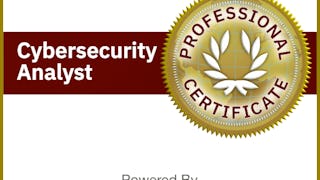Filter by
SubjectRequired
LanguageRequired
The language used throughout the course, in both instruction and assessments.
Learning ProductRequired
LevelRequired
DurationRequired
SkillsRequired
SubtitlesRequired
EducatorRequired
Explore the Knowledge Management Course Catalog

Multiple educators
Skills you'll gain: Network Security, Incident Response, Cloud Computing Architecture, Penetration Testing, Computer Security Incident Management, Cloud Services, Security Controls, Business Continuity, Disaster Recovery, Information Assurance, Peripheral Devices, Cybersecurity, Configuration Management, Computing Platforms, Cloud Security, Cloud Infrastructure, Network Troubleshooting, Cloud Platforms, Encryption, Data Storage
 Status: Free
Status: FreeUniversity of California, Davis
Skills you'll gain: Content Marketing, Content Performance Analysis, Content Strategy, Marketing Strategies, Content Creation, Strategic Marketing, Social Media Strategy, Marketing, Multimedia, Copywriting, Branding, Target Audience, Persona Development, Business Ethics

Skills you'll gain: Cyber Threat Hunting, Incident Response, IT Service Management, Identity and Access Management, Cloud Computing, Information Technology Infrastructure Library, Endpoint Security, Malware Protection, Penetration Testing, Linux, Computer Security Incident Management, Database Management, Network Security, Networking Hardware, TCP/IP, Cybersecurity, Intrusion Detection and Prevention, Cyber Threat Intelligence, Interviewing Skills, Cyber Security Assessment

Rutgers the State University of New Jersey
Skills you'll gain: Demand Planning, Competitive Intelligence, Strategic Sourcing, Competitive Analysis, Procurement, Market Intelligence, Purchasing, Supplier Management, Supply Chain, Inventory Management, Supply Management, Vendor Management, Management Consulting, Data Collection, Inventory Control, Business Consulting, Supply Chain Management, Inventory Control Systems, Forecasting, Supplier Performance Management
 Status: New
Status: NewSkills you'll gain: Django (Web Framework), Responsive Web Design, HTML and CSS, Relational Databases, Object Oriented Programming (OOP), Database Management Systems, Bootstrap (Front-End Framework), SQL, Database Design, Databases, Front-End Web Development, Unit Testing, MySQL, Debugging, User Interface (UI), Web Development, Web Servers, Test Driven Development (TDD), Web Applications, Programming Principles

Google
Skills you'll gain: Programming Principles, Scripting, Python Programming, Computer Programming, Computational Thinking, Algorithms, Data Structures, Integrated Development Environments, Debugging, Development Environment

Johns Hopkins University
Skills you'll gain: Shiny (R Package), Rmarkdown, Exploratory Data Analysis, Regression Analysis, Leaflet (Software), Version Control, Statistical Analysis, R Programming, Data Manipulation, Data Cleansing, Data Science, Statistical Inference, Predictive Modeling, Statistical Hypothesis Testing, Data Wrangling, Data Visualization, Plotly, Machine Learning Algorithms, Plot (Graphics), Knitr

Emory University
Skills you'll gain: Management Consulting, Business Consulting, Consultative Approaches, Business Management, Analysis, Client Services, Business Strategies, Decision Making, Complex Problem Solving

Skills you'll gain: Cloud Infrastructure, Kubernetes, Google Cloud Platform, Identity and Access Management, Prompt Engineering, Application Deployment, Cloud Storage, Containerization, Infrastructure As A Service (IaaS), Cloud Computing, CI/CD, Cloud Computing Architecture, Cloud Security, Cloud Management, Cloud Services, Load Balancing, Service Level Agreement, Infrastructure as Code (IaC), Microservices, Process Analysis

Skills you'll gain: Threat Management, Cybersecurity, Risk Management Framework, Risk Management, Business Risk Management, Incident Response, Vulnerability Management, Security Information and Event Management (SIEM), Security Controls, Continuous Monitoring, Information Systems Security, Enterprise Security, Risk Analysis, Threat Detection, Information Assurance, Open Web Application Security Project (OWASP), Auditing

Google Cloud
Skills you'll gain: Cloud Infrastructure, Google Cloud Platform, Identity and Access Management, Prompt Engineering, Kubernetes, Application Deployment, Cloud Storage, Infrastructure As A Service (IaaS), Containerization, Cloud Computing, CI/CD, Cloud Security, Cloud Computing Architecture, Cloud Services, Load Balancing, Service Level Agreement, Infrastructure as Code (IaC), Microservices, Virtual Machines, Service Level

Skills you'll gain: Cloud Infrastructure, Kubernetes, Google Cloud Platform, Identity and Access Management, Prompt Engineering, Cloud Storage, Containerization, Infrastructure As A Service (IaaS), Cloud Computing Architecture, Cloud Management, Cloud Services, Load Balancing, Cloud Engineering, Application Deployment, Infrastructure as Code (IaC), Virtual Machines, Cloud Computing, Data Storage, Network Infrastructure, Docker (Software)
Knowledge Management learners also search
In summary, here are 10 of our most popular knowledge management courses
- IBM and ISC2 Cybersecurity Specialist: ISC2
- The Strategy of Content Marketing: University of California, Davis
- IBM Cybersecurity Analyst: IBM
- Supply Chain Analytics: Rutgers the State University of New Jersey
- Meta Web Development Fundamentals: Meta
- Crash Course on Python: Google
- Data Science: Johns Hopkins University
- Introduction to Management Consulting: Emory University
- Preparing for Google Cloud Certification: Cloud Architect: Google Cloud
- Play It Safe: Manage Security Risks: Google










